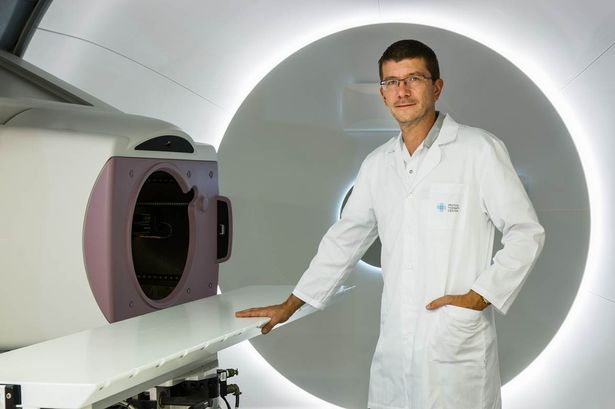Health
Prostate Cancer Awareness: Doctor Urges Men to Monitor Symptoms

A leading oncologist is urging men to be vigilant about their urinary health due to the rising rates of prostate cancer in the UK. With approximately 55,000 new cases diagnosed each year, the disease has become the most prevalent cancer among men in the region. Dr. Jiri Kubes, a radiation oncologist at the Proton Therapy Center, emphasizes the importance of recognizing early symptoms, which often go unnoticed until the cancer progresses.
Prostate cancer typically remains asymptomatic in its early stages, complicating the efforts for timely diagnosis. Dr. Kubes explains, “Many men with prostate cancer will have no symptoms until the cancer spreads to other parts of the body. There’s currently no national screening for prostate cancer, so finding early cases is difficult.”
Recognizing Symptoms and Seeking Help
Men are encouraged to monitor any changes in their urinary habits closely. Symptoms can include difficulty starting urination, an urgent need to go, an increased frequency of urination at night, and a weak stream. More concerning signs may involve a feeling of incomplete bladder emptying or the presence of blood in urine or semen.
Dr. Kubes notes that while many of these symptoms may arise from benign conditions, such as an enlarged prostate, it is critical to consult a healthcare provider if any changes occur. “It can be easy to bury your head in the sand, but don’t wait for things to get worse. It’s important to speak up, and there is nothing to be embarrassed about,” he adds.
Prostate cancer develops in the walnut-sized prostate gland, typically manifesting symptoms only when it exerts pressure on the urethra, the tube responsible for urine transport. The risk of developing prostate cancer significantly increases for men over the age of 50, those with a family history of the disease, and members of the black community.
Treatment Options and Advances
Treatment options for prostate cancer include radiotherapy, hormonal therapy, and surgery, particularly radical prostatectomy, which involves complete removal of the prostate. Dr. Kubes is a proponent of proton therapy, a form of radiotherapy that employs a precise ‘pencil beam’ of positively charged particles. This method targets tumors with remarkable accuracy, minimizing damage to surrounding healthy tissue and reducing the risk of secondary cancers.
“Our message is clear: if you feel anything is amiss, don’t hesitate to seek help. It might just save your life,” Dr. Kubes urges. The emphasis on early intervention and awareness is crucial in the fight against prostate cancer, allowing for better outcomes and improved quality of life for patients.
In conclusion, men are reminded to take charge of their health by remaining alert to changes in their bodies and seeking assistance when necessary. Increased awareness and proactive measures can lead to earlier detection and treatment, ultimately saving lives in the battle against prostate cancer.
-

 Health3 months ago
Health3 months agoNeurologist Warns Excessive Use of Supplements Can Harm Brain
-

 Health3 months ago
Health3 months agoFiona Phillips’ Husband Shares Heartfelt Update on Her Alzheimer’s Journey
-

 Science1 month ago
Science1 month agoBrian Cox Addresses Claims of Alien Probe in 3I/ATLAS Discovery
-

 Science1 month ago
Science1 month agoNASA Investigates Unusual Comet 3I/ATLAS; New Findings Emerge
-

 Science4 weeks ago
Science4 weeks agoScientists Examine 3I/ATLAS: Alien Artifact or Cosmic Oddity?
-

 Entertainment4 months ago
Entertainment4 months agoKerry Katona Discusses Future Baby Plans and Brian McFadden’s Wedding
-

 Science4 weeks ago
Science4 weeks agoNASA Investigates Speedy Object 3I/ATLAS, Sparking Speculation
-

 Entertainment4 months ago
Entertainment4 months agoEmmerdale Faces Tension as Dylan and April’s Lives Hang in the Balance
-

 World3 months ago
World3 months agoCole Palmer’s Cryptic Message to Kobbie Mainoo Following Loan Talks
-

 Science4 weeks ago
Science4 weeks agoNASA Scientists Explore Origins of 3I/ATLAS, a Fast-Moving Visitor
-

 Entertainment4 months ago
Entertainment4 months agoLove Island Star Toni Laite’s Mother Expresses Disappointment Over Coupling Decision
-

 Entertainment3 months ago
Entertainment3 months agoMajor Cast Changes at Coronation Street: Exits and Returns in 2025









